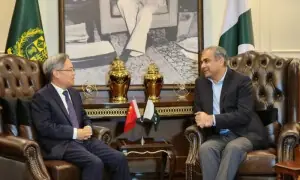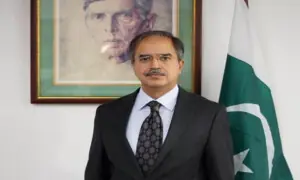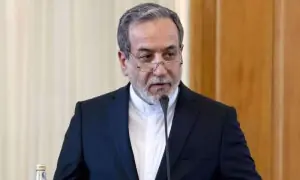No major breakthrough yet as Istanbul talks drag on
Negotiations between Pakistan and the Afghan Taliban regime are expected to continue for a third consecutive day in Istanbul, Türkiye, today (Monday) as both sides have so far been unable to make headway on key security issues.
According to diplomatic sources, the second day of talks ended without any decisive progress, though both delegations held a marathon 15-hour session during which they exchanged proposals in the presence of mediators and drafted a preliminary framework for a potential agreement.
Afghan news outlet Tolo News, citing informed sources, reported that the Afghan delegation presented a draft containing two main demands: that Pakistan refrain from violating Afghanistan’s airspace and borders, and that it prevent its territory from being used by any group carrying out attacks against Afghanistan.
The draft was relayed to Pakistan’s team through mediators, after which Islamabad submitted its own revised proposal to Afghan representatives.
Action against terrorism
Pakistan emphasised the need for concrete and verifiable measures to prevent cross-border infiltration and planned attacks from Afghan soil.
Islamabad maintained that terrorist groups operating from Afghanistan pose a serious threat to regional stability and must be dismantled.
Afghan international affairs expert Wahid Faqiri told Tolo News that if both countries manage to agree on reducing border tensions and enhancing cooperation, “any such accord could hold for a few months.”
Both sides have also reportedly agreed in principle to establish a four-party monitoring mechanism to oversee the implementation of a possible ceasefire and address violations through a formal information-sharing channel.
Joint monitoring committees
Foreign affairs analyst Bilal Umar said that joint monitoring committees would be formed to ensure compliance with the terms of any agreement reached.
Pakistan has reiterated its stance that Afghan soil must not be used for terrorism and for attacks against Pakistan, while the Taliban officials proposed involving other countries in the monitoring mechanism.
The sources clarified that Türkiye, like Qatar, is acting as a neutral facilitator in the Istanbul talks, and reports suggesting bias or favour are unfounded.
Pakistan has conveyed that it is fully capable of responding to any potential provocation or “misadventure” and will safeguard its national interests under all circumstances.
Earlier, during the latest round of discussions, Pakistani negotiators presented their final position to the Taliban, rejecting the group’s “illogical and unrealistic” justifications for sheltering militants.
Security sources said Pakistan made it clear that the Taliban’s continued support for terrorist elements was unacceptable and that only “tangible action” could ensure the end of cross-border violence.
Separate agenda
Islamabad believes the Taliban are pursuing “a separate agenda” that does not serve the interests of Afghanistan, Pakistan, or regional peace.
Diplomatic sources revealed that during the exchanges, the Taliban offered to relocate members of the banned Tehreek-e-Taliban Pakistan (TTP) to new areas inside Afghanistan — a proposal Pakistan categorically rejected.
Instead, Pakistan urged the Taliban to take decisive action against the TTP and honour their commitments to the international community.
Pakistan further stressed that attacks linked to Fitna Al Khawarij and Fitna Al Hindustan must cease completely, and that Afghan territory must not be used for anti-Pakistan activities.
Counter-terrorism mechanism
The Pakistani side also called for a clear and robust counter-terrorism mechanism as a precondition for progress in talks, warning that it would show no flexibility if assurances were not satisfactory.
Pakistan reaffirmed its desire for friendly, brotherly relations with Afghanistan but made it clear that it reserves the right to take all necessary measures to ensure its security.
The Pakistani delegation comprises seven senior officials representing the military, intelligence agencies, and the Foreign Office, while the Afghan Taliban team is led by the group’s deputy interior minister.
The current dialogue follows the earlier round held in Doha, where Pakistan had presented a comprehensive counter-terrorism plan that the Taliban agreed to review and respond to in the coming days.
For the latest news, follow us on Twitter @Aaj_Urdu. We are also on Facebook, Instagram and YouTube.






















Comments are closed on this story.